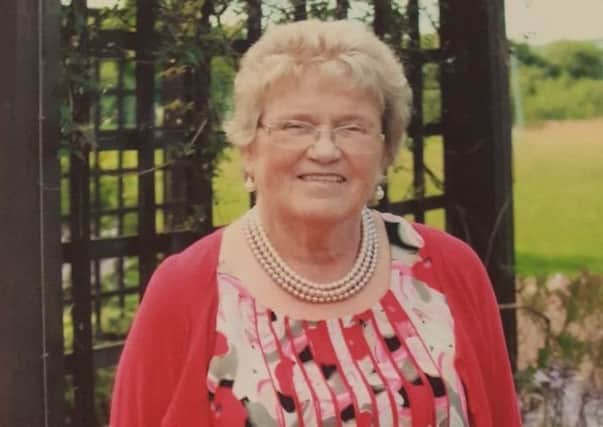Obituary: Etta Haire MBE, single mother who helped transform housing conditions in Clydebank


Harriet – known as Etta – Haire was a remarkable lady who overcame personal misfortune to became a prominent figure in Clydebank and nationally in the community housing association sector, for which she was awarded an MBE.
Widowed at 43 with five children to bring up, she did so successfully through dint of hard work and the application of her sterling personal qualities.
Advertisement
Hide AdAdvertisement
Hide AdAged almost 60, she was an original member of the steering group which led to the Trafalgar Housing Co-Operative in 1990, later the Trafalgar Housing Association, so called because its initial involvement centred on housing in that Clydebank street in the Dalmuir area, where she and her family lived.
She remained involved in the Association until 2016, served three terms as chairperson and spells as secretary and vice chair. Widely admired for her integrity, drive, community spirit and genuine desire to improve everyone’s lot, she was very much at the forefront of Trafalgar’s success, although modesty precluded her accepting such acclaim.
She epitomised the association’s aims, which were to provide, manage and maintain good quality affordable housing, controlled by local people, to contribute to the area’s wellbeing. For her, tenants’ interests in having decent housing, economic rents and an effective repair service were paramount and she was unceasing in her efforts to promote them.
Born Harriet Dawkins Higgins in Clydebank, she was the eldest of four children of George and Isabella and brought up in the town’s Livingstone Street area.
A bright pupil, she initially attended a local primary school before going on to Dumbarton Academy, where her academic ability was noted. Family circumstances curtailed her schooling.
These were difficult times, especially with the onset of the Blitz, which caused not only considerable loss of life but enormous damage to the town. Her father worked as dock porter and was also an air raid warden at this time. She sometimes recalled her experiences of being ushered into shelters during raids. When the war finished, the family moved to Morecambe, whose coastal location, it was thought, would help with her father’s respiratory difficulties, but unfortunately he died in 1946.
The family then returned to Clydebank where Mrs Haire started working in the bakery to contribute to the family budget. In 1950 she met Sam Haire socially in the town and they started going out together. He was from Belfast, where he worked at Harland and Wolff shipyard, and a year later the couple married in Clydebank, where they set up home, with Mr Haire finding work at the town’s John Brown’s yard.
They had six children – Margaret, Billy, Gordon, Andrew, Isobel and Debbie – and by 1962 moved into a house in the then newly built Trafalgar Street.
Advertisement
Hide AdAdvertisement
Hide AdIn 1973 Sam Haire died after a short period of illness, leaving his wife to bring up five dependent children, Margaret having recently married. Mrs Haire worked as a school cleaner, doing both morning and evening shifts, and did a fine job of raising her family.
Her family recalled: “She really showed grit and determination to ensure we all had a good upbringing. Money. of course. was tight but with her wages and the welfare state’s contribution, we were always well fed and clothed.”
With the passage of time, the street’s housing stock deteriorated and by the 1980s the problems caused by poor insulation, flat roofs, and the decaying fabric of three- storey tenements brought social issues in their wake.
The area was becoming less and less attractive to tenants and it was clear that Clydebank District council, landlords for most properties, had no funds to invest in improvement work.
This predicament coincided with Mrs Haire’s approaching retirement at a time when her family were almost independent and represented a challenge to her for the betterment of her community. She and colleagues succeeded in having the housing stock of 218 properties transferred to the Trafalgar Association after a tenants’ poll showed 91 per cent in favour. Over the ensuing years, in six phases of development, considerable refurbishments were carried out involving some demolition and new construction. In 1998 she played a crucial role in the transfer of 180 properties in “the Terraces”, in the town’s Radnor Park, to the Trafalgar Association. This was achieved despite competition from others and much credit was due to Mrs Haire, whose advocacy at public meetings and standing as a fellow tenant and lead figure in the Association was instrumental in eliciting a 90 per cent favourable vote. These houses, which were also run down, were demolished and rebuilt.
An MBE in 2000 followed, but she insisted it was for the Association, not her. She and her family spent a very enjoyable day at Buckingham Palace in the Queen’s company.
Months previously she had been treated to a surprise celebration of her award when the Director of the Scottish Federation of Housing Associations attended to give a speech in her honour.
Her genuine interest in others was reflected in a lifelong interest in politics. She enjoyed dancing and for about 20 years enjoyed a loving relationship with Bill Jardine, until his death in 1998. He had family in South Africa whom they visited and she also enjoyed travelling to visit her family throughout the UK.
Advertisement
Hide AdAdvertisement
Hide AdA member of the Morison Memorial Church, she set up a toddlers’ group and volunteered in the cafe. Mrs Haire is survived by five children, Andrew having died last year, 12 grandchildren and six great grandchildren.
JACK DAVIDSON